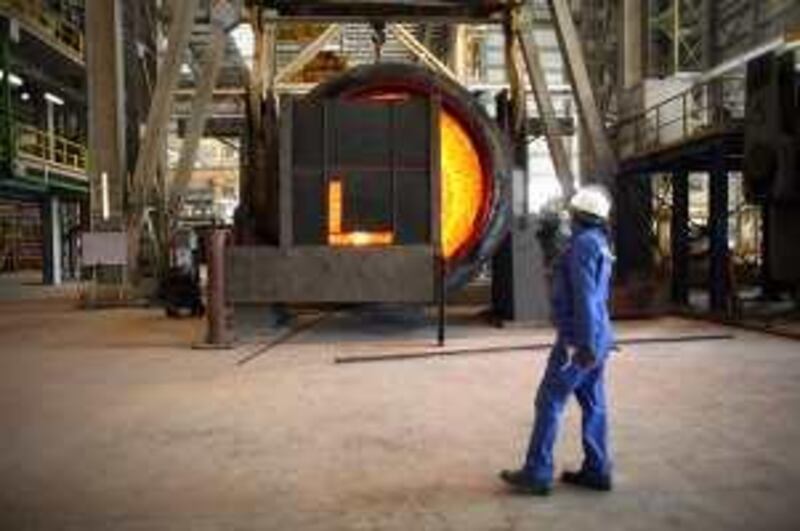Emirates Steel Industries (ESI) will build a number of billion-dollar plants and acquire Gulf rivals in a bid to become the region's biggest steel company within five years, executives said yesterday. But the company will first need to address the refinancing of a US$500 million (Dh1.83bn) bridging loan that falls due next summer, officials said. They were speaking at the inauguration of ESI's integrated steel operation in Musaffah, which was led by Sheikh Mohammed bin Zayed, the Crown Prince of Abu Dhabi and Deputy Supreme Commander of the UAE Armed Forces.
ESI now has capacity to produce 2 million tonnes of steel a year, which will grow to 6.5 million tonnes by late 2013 or early 2014, said Hussain al Nowais, the company chairman. "We will continue to grow by expanding capacity and by acquisition," Mr al Nowais said. "The crisis has created opportunities ? that will make us grow faster, and the consolidation will make us bigger." Mr al Nowais would not specify which Gulf companies were acquisition targets, but he told Dow Jones the first deal could be "completed within weeks".
ESI is building an expansion next to the new plant to raise total capacity to 3 million tonnes by 2011, at a cost of Dh6bn. To pay for it, the company took out a bridging loan last September that it hopes to refinance into a long-term syndicated loan by year's end, said Stephen Pope, the chief financial officer. Mr Pope said ESI was backed by the creditworthiness of its owner, Abu Dhabi Basic Industries (ADBIC), and a long-term financing agreement would be signed well before the bridging loan expired. ABDIC is a wholly owned subsidiary of the Abu Dhabi Government's General Holding Corporation.
Industrial projects are often financed through long-term syndicated loans but the credit crunch forced many UAE firms to seek short-term financing at the end of last year. "The banks have been reluctant in extending credit," Mr al Nowais said. "We now see banks are easing a bit more. We see credit is available a bit more." ESI's new plant is coming online at an especially tough time for the steel industry. By Mr al Nowais's reckoning, the country's steel market shrank by between 30 per cent and 40 per cent in the past year, and prices on the London Metal Exchange have failed to rebound much above lows of $300 a tonne.
ESI will benefit from a low cost structure that places it among the top 25 per cent of international firms in terms of cost competitiveness, said Hassan Sha'sha'a, the vice president for strategy and development. The company's new plant in Musaffah turns iron oxide pellets directly into usable steel products, offering greater efficiencies and a larger profit margin. Mr al Nowais, who holds several high-profile positions in Abu Dhabi industry, including chairman of ADBIC and the National Petroleum Construction Company, said the emirate's economy was recovering on the back of continued investment in infrastructure, industry and property through the recession.
Large firms connected to the Government, including ESI, the Abu Dhabi National Oil Company and Emirates Aluminium, have continued investing during the crisis to take advantage of lower costs for materials and labour. "Our economy is fuelled by such expenditures, whether that is government, semi-government, or private," Mr al Nowais said. He said the economy would probably never return to the rapid growth recorded before the crisis, and ESI was basing predictions on more modest growth in demand.
cstanton@thenational.ae





